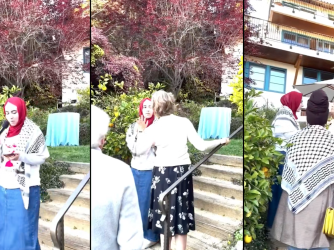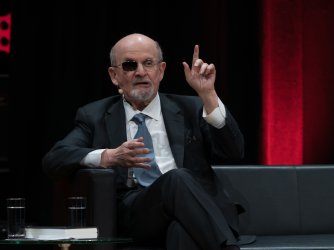Table of Contents
Free Speech Week Fallout at American University
Last week here on The Torch, Jaclyn penned a roundup of the Free Speech Week activities that took place nationwide during the first week of April. While the vast majority of events went off without a hitch, students at American University had a disappointing experience:
Not all groups were so lucky, disappointingly. The Free Speech Wall at American University was removed by campus police without any notice between Monday night and Tuesday morning. According to AU student Alex McHugh, when the AU Students For Liberty contacted the Student Activities office (which had approved the event, and an identical one last fall), the office "stated that they support the removal and would have done the same." After negotiations last week, AUSFL was allowed to rebuild the wall this Wednesday once the group agreed to "staff" the wall while it was up.
Frustrated by the heavy-handed censorship his group encountered, McHugh took to the pages of AU's student newspaper, The Eagle, to express his dismay with AU's actions in an op-ed. Taking on the "culture of political correctness" that prompted "the ‘destroy first, ask questions later' action taken by Public Safety," McHugh wrote:
A culture of restriction, let alone a solid regulation against certain types of speech and expressions, conditions us not to speak our mind and to conform to popular opinion without challenging it. This means that whoever is setting the terms for what is correct and what isn't (be it those in power, the majority or the loudest, most offended faction) has a monopoly on what is considered offensive.
In the interest of erring on the side of expression, we should avoid this outcome.
Part of the purpose of college life is to challenge what is accepted both in the main and by the individual. If we never say anything that offends anyone, how can we ever challenge those mainstream sensibilities?
McHugh's excellent points were heard loud and clear by AU administrators. Yesterday, The Eagle published a letter to the editor responding to McHugh's op-ed from Nicole Mehta, Coordinator of Academic and Intercultural Programs at AU. It's worth looking at Mehta's letter closely here.
Refreshingly, Mehta first admits that mistakes were made:
On April 3, a Free Speech Wall built on the Quad by Students for Liberty and approved as a student event by Student Activities was taken down by Public Safety without customary consultation.
The usual protocol would be for Public Safety to consult with University Center and/or Student Activities prior to removing any structures associated with an approved event.
Campus Life staff has taken the necessary steps to ensure that the customary protocol is followed in the future.
It would be interesting to know precisely what these steps were, but for now, we'll take Mehta's word for it. At least Mehta recognizes that AU's initial reaction was problematic, to say the least, so that's a good and welcome start.
Next, Mehta provides an explanation of AU's decision to require Students For Liberty members to "staff" the free speech wall as a condition for putting it back up:
In light of last week's op-ed by Students for Liberty's Alex McHugh, Student Activities thinks it is important to affirm the University's commitment to freedom of expression and clarify the reasons for the conditions placed on reinstatement of the Free Speech Wall.
Student Activities' expectation is that Students for Liberty, as the leaders of the event, will engage in dialogue with students about the purpose and content of the Free Speech Wall. Certain language and statements, although offensive to some, are protected. However, anonymous, derogatory statements about specifically named individual students are not. (Emphasis added.)
Unfortunately, this is more problematic. While Mehta acknowledges that mere offensiveness to some isn't grounds for censorship, she doesn't quite get the concept of defamation correct, which is what I think she's aiming for with the reference to "anonymous, derogatory statements about specifically named individual students."
For a more thorough discussion of what exactly constitutes defamation—which isn't protected by the First Amendment—let's consult FIRE's Guide to Free Speech on Campus. In the Guide, we first note that the "precise legal elements of defamation vary from state to state, but the offense must always be premised on a false and derogatory statement." So there's our first problem: AU isn't requiring that the statement be false to lose protection, but just derogatory. This means students can't communicate their opinions, as we explain in the Guide:
Furthermore, to be defamatory a statement must be an assertion of fact (rather than mere opinion) and capable of being proven false. A statement of opinion, by itself, cannot be defamation. For example, saying that "Alex is a jerk" would not be defamation. This would not be understood by any reasonable listener to be anything other than opinion. Also, statements that are so hyperbolic or exaggerated that no one could consider them to be statements of fact are also protected (for instance, "Alex has the charm of a rattlesnake"). Because of these requirements, everyday insults and epithets are usually not considered defamatory.
Continuing on to the other elements of defamation, the Guide notes that "[i]n addition to being false, the statement, to be defamatory, must identify its victim by naming or reasonably implicating the person allegedly defamed." Fair enough; AU's requirement that the statement be about a specific individual fits. A defamatory statement must also be published, and because "the common legal definition of ‘published' in this context requires only that the allegedly defamatory statement be communicated to the target and at least one other person," writing on the Free Speech Wall counts.
But one other crucial element of defamation isn't captured by AU's apparent understanding of the concept, as detailed in Mehta's letter: that the speech in question must cause real harm. As the Guide explains:
Finally, it is necessary that the plaintiff prove that he or she was actually harmed by the statement. An important misconception about defamation is that the offense comes from the emotional hurt the defamation causes. That is not the case. The reason behind laws against defamation is not to protect individuals from feeling bad, but to prevent unjust damage to their reputations, livelihoods, or both. Such harm, to be defamatory, must have real negative impact on their lives. In many libel cases the supposedly defamed plaintiffs must show that their careers or finances suffered from the statement. Defamation is not based solely on the emotional distress felt by the target. In other words, defamation is about objective harm, not subjective hurt.
Because AU apparently seeks to prohibit speech that is simply "derogatory," it fails to accurately track the legal notion of defamation.
The restriction of anonymous speech is also troubling. As the Supreme Court pointed out in McIntyre v. Ohio Elections Commission, 514 U.S. 334, 341-342 (1995), "The decision in favor of anonymity may be motivated by fear of economic or official retaliation, by concern about social ostracism, or merely by a desire to preserve as much of one's privacy as possible ... Accordingly, an author's decision to remain anonymous, like other decisions concerning omissions or additions to the content of a publication, is an aspect of freedom of speech protected by the First Amendment." And on a practical note, does Mehta really expect Students For Liberty to require that students using the free speech wall sign their name to their comments? That kind of policing defeats the purpose of a "free" speech wall, doesn't it?
Of course, AU is a private university, and thus not bound by the First Amendment. But it is bound by its own promise to students that "[f]reedom of expression and dissent is protected by university policy for all members of the university community." So while I appreciate Mehta's admission of error and AU's recognition that mere offensiveness doesn't justify censorship, it's nevertheless a little disheartening to see the university attempt to restrict other forms of protected speech by placing inexact conditions on students' attempts to celebrate the importance of freedom of expression in our modern liberal democracy.
Recent Articles
FIRE’s award-winning Newsdesk covers the free speech news you need to stay informed.

No, the Berkeley Law student didn’t have a First Amendment right to interrupt the dean’s backyard party

Salman Rushdie calls out left-wing censorship in CBS interview

Falsely claiming a First Amendment right at a dinner party at private home — FAN 419.1
